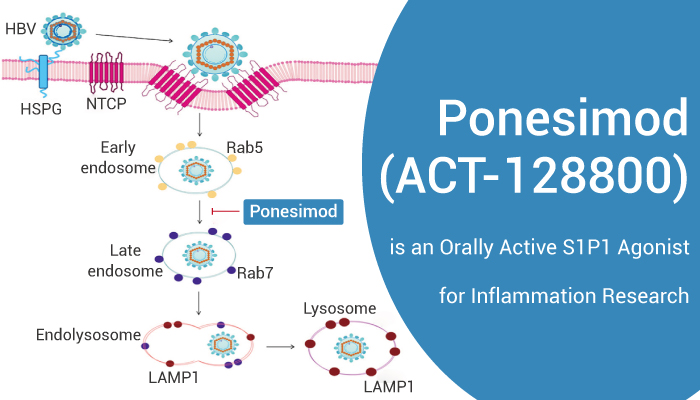Sphingosine-1-phosphate receptor 1 (S1P receptor 1 or S1PR1), also known as endothelial differentiation gene 1 (EDG1). S1PR1 is a G-protein-coupled receptor which binds the bioactive signaling molecule sphingosine 1-phosphate (S1P). S1P, a potent bioactive lipid, exerts many biological effects on different types of cells, including normal cells, and these effects include changes to cell migration, proliferation, and angiogenesis. In addition, S1P can promote the motility, survival, growth, and transformation of cancer cells through multiple pathways. In addition, S1PR1 signaling is important in the regulation of lymphocyte maturation, migration and trafficking.
Ponesimod (ACT-128800) is a potent, selective and orally active agonist of S1P1
Ponesimod activates S1P1-mediated signal transduction with high potency. And it can cause dose-dependent sequestration of lymphocytes in lymphoid organs. Ponesimod can protect against lymphocyte-mediated tissue inflammation. In vivo, Ponesimod prevents delayed-type hypersensitivity in mice. Besides, Ponesimod causes a dose-dependent reduction in lymphocyte count, with a plateau effect being reached at 3 mg/kg in rats. Besides, Ponesimod is effective in relapsing multiple sclerosis. What’s more, in contrast to the long half-life/slow elimination of fingolimod, ponesimod is eliminated within 1 week of discontinuation and its pharmacological effects are rapidly reversible.
All in all, Ponesimod is a potent, selective and orally active agonist of S1P1 that has potential for inflammation research.
References:
[1] Liu YN, et, al. Cell Death Dis. 2019 Jan 18;10(2):50.
[2] D’Ambrosio D, et, al. Ther Adv Chronic Dis. 2016 Jan;7(1):18-33.
